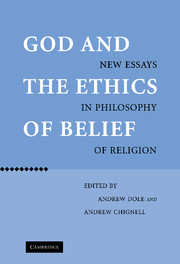Book contents
- Frontmatter
- Contents
- List of Contributors
- Acknowledgments
- The Ethics of Religious Belief: A Recent History
- PART ONE METAPHYSICS: GOD AND CREATURES
- 1 Can God Break the Laws?
- 2 Sleeping Beauty and the Afterlife
- 3 Free Will, Evil, and Divine Providence
- 4 Two Cheers for Mystery!
- PART TWO EPISTEMOLOGY: GOD AND THE ETHICS OF BELIEF
- PART THREE SOCIAL-POLITICAL PHILOSOPHY: GOD, ETHICS, AND BELIEF
- Index
1 - Can God Break the Laws?
Published online by Cambridge University Press: 25 July 2009
- Frontmatter
- Contents
- List of Contributors
- Acknowledgments
- The Ethics of Religious Belief: A Recent History
- PART ONE METAPHYSICS: GOD AND CREATURES
- 1 Can God Break the Laws?
- 2 Sleeping Beauty and the Afterlife
- 3 Free Will, Evil, and Divine Providence
- 4 Two Cheers for Mystery!
- PART TWO EPISTEMOLOGY: GOD AND THE ETHICS OF BELIEF
- PART THREE SOCIAL-POLITICAL PHILOSOPHY: GOD, ETHICS, AND BELIEF
- Index
Summary
Documents beginning with “it gives me great pleasure to …” ordinarily enjoy all the sincerity of Dear in Dear IRS. This case, however, is different; it really does give me great pleasure to contribute an essay to a volume dedicated to Nicholas Wolterstorff. He and I have been friends and colleagues (sometimes at a bit of a distance) for more than 50 years. I have learned much from him, and admire him enormously. No one has done more to enhance the renewal of Christian philosophy in the twentieth century. I'm delighted to take part in this project and am grateful to the editors for making it possible.
This paper is part of a larger project investigating a number of connected topics, all of them centering around the relation between God and the world, the notion of God's acting in the world, and the question of how properly to conceive the connection between scientific statements about the world and theological or religious statements about God's relation to the world and action in it. In this present bit of the project, I am interested in particular in the question of the relation between the laws of nature, if indeed there are any such things, and the ways, if any, in which God can act in the world. I'll be particularly interested in a fascinating argument by Sydney Shoemaker for the conclusion that the laws of nature are necessary in the broadly logical or metaphysical sense; if this is true, then perhaps God's possibilities of action in the world are severely limited.
- Type
- Chapter
- Information
- God and the Ethics of BeliefNew Essays in Philosophy of Religion, pp. 31 - 58Publisher: Cambridge University PressPrint publication year: 2005
- 1
- Cited by

